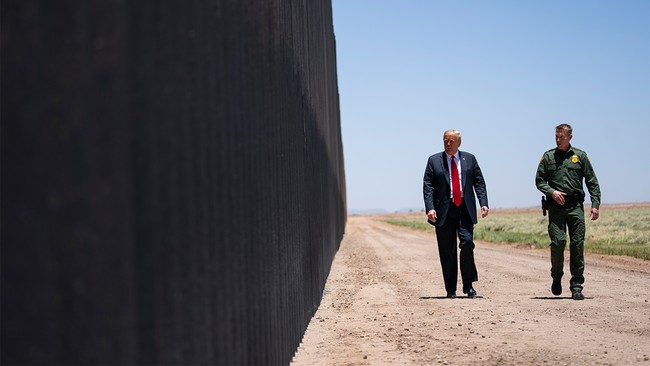President Donald Trump has taken swift action on immigration enforcement just days after returning to the Oval Office.
As part of a renewed focus on securing the southern border, Trump ordered the Pentagon to deploy thousands of additional active-duty U.S. troops to assist U.S. Customs and Border Protection (CBP).
This move comes as Trump declared a national border emergency on Monday, citing the need to address illegal migration and drug trafficking.
#BREAKING: President Trump has just signed an executive order designating drug cartels as foreign terrorist organizations
They can now be targeted with LETHAL FORCE by the U.S. military.
This is HUGE. pic.twitter.com/WAf7HhKVAY
— Nick Sortor (@nicksortor) January 21, 2025
Celebrate Trump’s Historic 2024 Victory with the Exclusive Trump 47th President Collection!
According to officials familiar with the deployment, approximately 2,200 active-duty forces are already stationed at the border as part of Joint Task Force-North, a U.S. Northern Command mission that supports CBP.
These forces primarily handle logistical and administrative tasks, such as data entry, detection and monitoring, and vehicle maintenance.
However, the newly deployed troops are expected to take on more specialized roles, including intelligence gathering and threat assessments.
While the specific units to be deployed this week remain unclear, additional personnel will assist in command-and-control operations and analyze illegal immigration patterns, according to sources familiar with the planning.
More troops are expected to arrive in the coming weeks and months to bolster the military presence.
The deployment of active-duty troops to the southern border is subject to restrictions under the Posse Comitatus Act, a law that prohibits active-duty military personnel from engaging in domestic law enforcement activities without authorization.
These limitations mean the troops cannot make arrests, seize drugs, or directly engage with migrants beyond transporting them to and from facilities.
A Congressional Research Service analysis has clarified that troops are also barred from conducting searches or other law enforcement duties unless expressly authorized.
Instead, their focus will remain on providing logistical and operational support to CBP.
On Monday, President Trump declared a national emergency at the southern border, citing what he described as an “invasion” of illegal immigration and drug trafficking. In an executive order, Trump emphasized the urgent need for action, stating:
“I will declare a national emergency at our southern border. All illegal entry will be immediately halted, and we will begin the process of returning millions and millions of illegal aliens back to the places from which they came.”
The executive orders also suggest that Trump is considering further measures to address the border crisis.
The president indicated that he would decide within 90 days whether to invoke the Insurrection Act of 1792, which would authorize the deployment of military forces within the United States under certain conditions.
The statute allows the president to use military resources to enforce laws, suppress insurrections, and repel invasions.
Trump’s decision to declare a border emergency and deploy additional military personnel reflects a broader strategy to address illegal immigration and enhance border security.
The administration has emphasized its commitment to halting illegal entry and cracking down on drug trafficking operations along the southern border.
The new deployments are part of what officials describe as a “strong crackdown” on illegal activities at the border.
With the first wave of troops already arriving, the administration aims to establish a larger military presence in the region to support CBP’s efforts and deter unlawful activity.
As the situation at the southern border evolves, Trump’s policies signal a return to a more aggressive approach to immigration enforcement.
The next 90 days could see further action, including the potential invocation of the Insurrection Act, as the administration works to implement its border security agenda.
The opinions expressed by contributors and/or content partners are their own and do not necessarily reflect the views of LifeZette. Contact us for guidelines on submitting your own commentary.
Read the full article here


![Trump Orders U.S. Military Troops to the Southern Border [WATCH] Trump Orders U.S. Military Troops to the Southern Border [WATCH]](https://www.rvmnews.com/wp-content/uploads/2024/10/2024.10.26-10.33-rvmnews-671cc562e3b85.jpg)


![Trump Agreed to Sit Down Interview with Serial Hoax Reporter Jeffrey Goldberg [WATCH] Trump Agreed to Sit Down Interview with Serial Hoax Reporter Jeffrey Goldberg [WATCH]](https://www.lifezette.com/wp-content/uploads/2025/01/2025.01.22-06.43-lifezette-67913c6c7af1c.jpg)



![Daytime Kidnapping Attempt in Florida Foiled by Quick-Thinking Good Samaritans [WATCH] Daytime Kidnapping Attempt in Florida Foiled by Quick-Thinking Good Samaritans [WATCH]](https://www.rvmnews.com/wp-content/uploads/2025/04/2025.04.25-06.45-rvmnews-680bd853d60f3.jpg)
